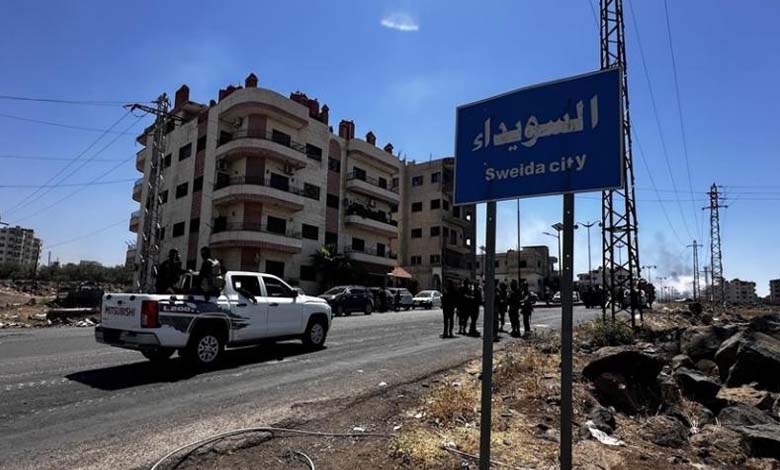Clashes near Sweida shatter ceasefire: Washington urges Syrians to build a new unified identity

Clashes erupted near the southern Syrian city of Sweida, breaking a ceasefire announced Friday evening by the United States between Israel and Syria. Fighting between Druze groups and Sunni tribal fighters has, despite official calls for calm, left hundreds dead and displaced tens of thousands in under a week.
-
Turkey Rejects Escalation with Israel in Syria and Calls for Diplomatic Solutions
-
Turkey seeks to establish a base in Syria to monitor the Kurdish forces and Israeli influence
US Special Envoy to Syria Tom Barack announced that Israeli Prime Minister Benjamin Netanyahu and interim Syrian President Ahmad Al-Sharaa had agreed to a ceasefire following two days of Israeli airstrikes on government sites in Damascus.
Posting on X, Barack called on Druze, Bedouin, and Sunni communities to lay down their arms and cooperate with other minorities in building a new, unified Syrian identity based on peace, prosperity, and regional coexistence.
-
“Including Syria and Lebanon”: How the Israeli Army Prepares for “Operation Winter”
-
The flying of Israeli jets very low over parts of Lebanon and blasts in Syria
The Syrian presidency confirmed a “comprehensive and immediate ceasefire” on Saturday, urging all parties to respect it and warning that any violations would be considered an infringement of national sovereignty, subject to legal consequences.
Simultaneously, the Interior Ministry announced the deployment of security forces in Sweida to “protect civilians and restore order,” according to spokesman Nour Eddine Al-Baba. He added that the government was committed to regaining control and stabilizing the province.
-
Al-Sharaa hands security in Sweida to Druze authorities to eliminate Israeli pretexts
-
Step Toward Sanctions Relief: UN Report Denies Links Between Hayat Tahrir al-Sham and Al-Qaeda
Despite the ceasefire, fighting between Sunni tribal fighters and Druze militias continued Friday, particularly at the western entrance to Sweida. The Syrian Observatory for Human Rights (SOHR) also reported shelling of several neighborhoods in the city.
According to SOHR, the clashes have killed at least 638 people since last Sunday. Israeli involvement has further complicated efforts by the transitional government, led by Al-Sharaa, to consolidate control over Syrian territory more than seven months after the former regime’s collapse.
-
UN Report Denies Any Link Between Damascus and Al-Qaeda
-
Trump Ends Sanctions on Syria as Israel Signals Interest in Normalization
The violence raises renewed questions about the government’s capacity to manage Syria’s sectarian diversity in a volatile environment.
The humanitarian situation in Sweida is dire. The city’s only public hospital lacks electricity, water, and essential medicines. Medical staff reported receiving over 400 bodies since Monday, including women, children, the elderly, and combatants. Overwhelmed doctors and nurses struggle to treat a constant flow of wounded civilians.
-
Have the Muslim Brotherhood Lost Their Last Card in the Syrian Arena?
-
Germany Refuses to Repatriate ISIS Fighters: Syria’s Delayed Justice Dilemma
Israel announced it would send $600,000 worth of humanitarian aid to Sweida, including food and medical supplies. UN High Commissioner for Human Rights Volker Türk called for an immediate end to the bloodshed and the launch of swift, independent investigations into all reported violations.
The International Organization for Migration (IOM) reported that some 80,000 people have been displaced by the fighting in Sweida.
-
Israel Announces Arrest of Hamas Operatives – Details of the Night Operation in Syria
-
Alarming Resurgence of ISIS in Syria Following al-Assad’s Fall
While the Syrian state news agency SANA claimed new Israeli airstrikes took place Thursday night, the Israeli military denied any operations in the area during that time. Nevertheless, Israel had warned of further escalation unless Syrian government forces withdrew from the province, citing a need to protect the Druze minority.
Fighting was initially triggered by the abduction of a Druze vegetable merchant, leading to a cycle of retaliatory kidnappings. When government forces intervened on Monday, eyewitnesses and Druze factions accused them of siding with Bedouin fighters.
-
U.S. Troop Reduction in Syria Puts SDF in Disarray
-
Between Breaking Isolation and Renewing It: What Does the Lifting of Sanctions on Syria Really Mean? Experts Weigh In
Sunni tribal reinforcements arrived from across Syria to support the Bedouin. Near the Druze village of Wulgha, Sheikh Ali Al-Inad said his men came from Hama province after a call for help. The village, now under tribal control, suffered property damage and arson.
According to SOHR, the tribal deployment was facilitated by the government forces’ inability to remain in Sweida due to Israeli threats.
-
Al-Assad Regime Remnants Seek to Return Syria to Chaos
-
Have Foreign Fighters Become a Burden on the New Syria?
There are an estimated 700,000 Druze in Syria, mainly in the south. As the violence escalates, humanitarian agencies, including the International Committee of the Red Cross, have voiced deep concern about worsening conditions.
Russian President Vladimir Putin, during a phone call with his Turkish counterpart Recep Tayyip Erdoğan, expressed serious concern over the violence and called for urgent stabilization in Syria.












